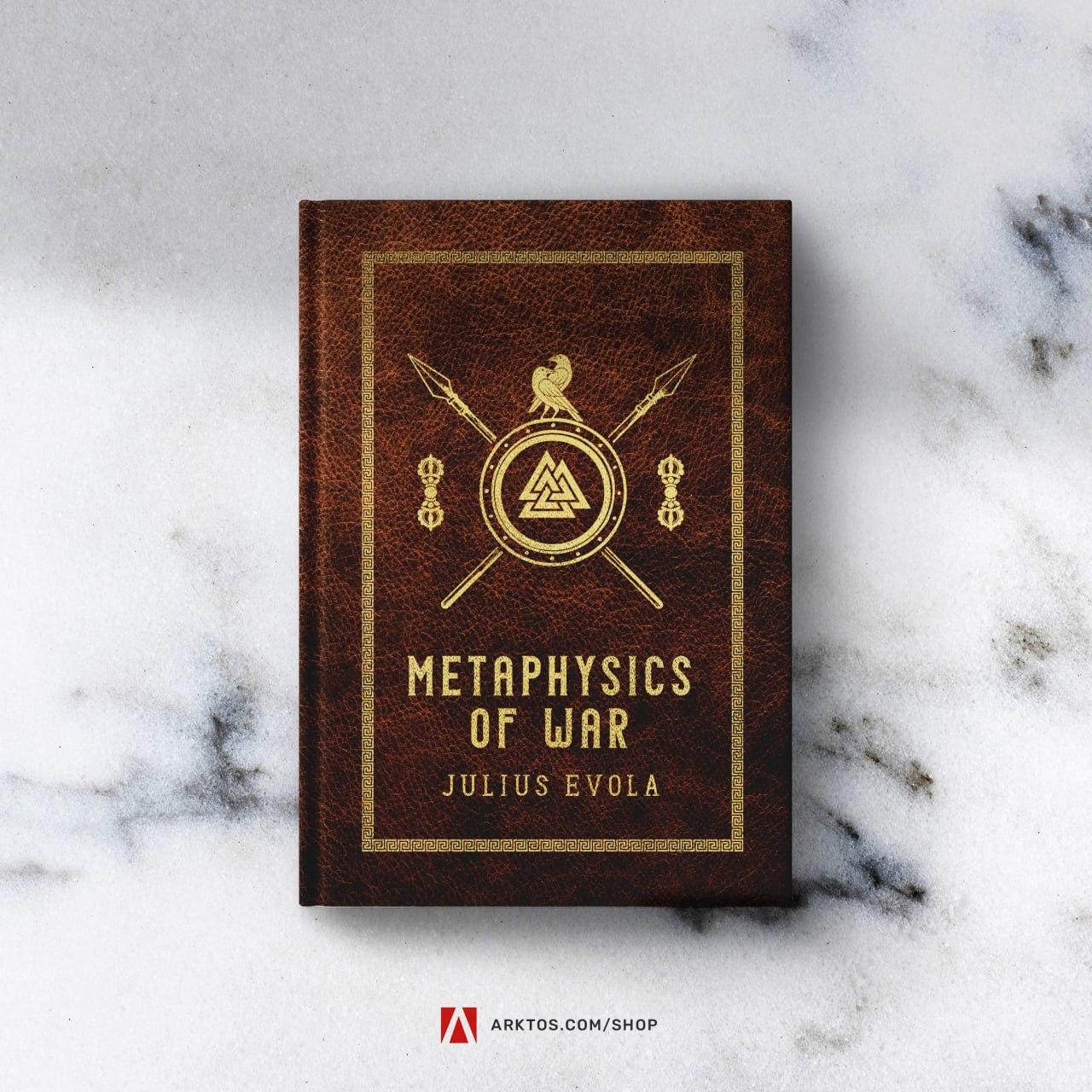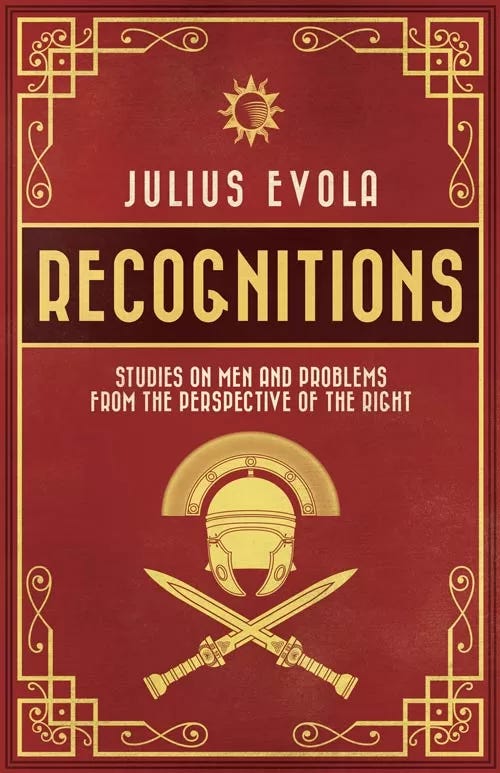Rethinking the Right - Part III
by Julius Evola
In this third installment of a series of Julius Evola’s meditations on the postwar Right, the Italian Traditionalist argues that while the Left has developed a coherent and far-reaching historiography grounded in Marxist and Enlightenment ideals, the Right still needs to write its history: one that recognizes spiritual and traditional forces rather than economic determinism and restores a deeper understanding of the reasons behind Europe’s decline.
The Historiography of the Right
A noted German historian, Carl Schmitt, once observed that while the left had systematically elaborated and perfected its historiography as the general background for its destructive action, nothing of the like had appeared in the opposite camp, in that of the Right. Schmitt made this observation while expounding certain considerations on the European significance that one might attribute to Donoso Cortés, that most interesting political man and Spanish thinker, who developed his activity in the period of the first revolutionary and socialist European movements. And Schmitt noted that the historiographical work of the Right at that time could be reduced to a few sporadic essays which were in no way comparable, in their coherency, radicalism and breadth of horizons, to that which Marxism and the left have long possessed in this sphere.
In large part, Schmitt is correct. In fact, if one sets aside all history of Marxist intonation, the only history known to most, the only history which matters, is essentially of liberal, Enlightenment, and Masonic derivation and origin. It takes its inspiration from those ideologies of the Third Estate which have served only to prepare the ground for the radicalist movements of the left; and these themselves stand of course on an essentially anti-traditionalist foundation.
A historiography of the Right has yet to be written, and this constitutes one of our titles to inferiority with respect to the ideologies and the agitating action of the left. Not even the so-called “fatherland history” can compensate for this lacuna, because, apart from its possible national coloratura and its touching commemorations of heroic incidents and figures, it itself is effected in large measure by the suggestions of thought which does not belong to the true Right. Above all, it cannot bear competition, in terms of the breadth of its horizons, with the historiography of the left.
This is the fundamental point. Indeed, one must recognize that the historiography of the left has known how to cast its glance to the essential dimensions of history. Beyond conflicts and episodic political revolutions, beyond the history of the nations, it has known how to glimpse that general and essential process which has been realizing itself in these last centuries, as transition from one type of civilization and society to another. That the basis of its interpretation has been in this connection economic and classist subtracts nothing from the breadth of framework of its whole historiography.

It indicates to us the essential reality in the course of history, beyond all contingent and particular reality—specifically, in the end of the feudal and aristocratic civilization, the advent of the bourgeois, liberal, capitalistic and industrial, and, after this, the annunciation and the incipient realization of a socialist, Marxist and finally communist civilization. Here the revolutions of the Third and Fourth Estates are recognized in their natural causal and tactical concatenation. It contemplates the idea of an over-ordered process, served by forces which had no desire to serve it and did not know they were serving it—by the more or less “sacred” egoisms of the peoples, and by the rivalries and the ambitions of those who believed they were “making history,” without ever departing the field of the particular. It studies precisely the transformations of the whole of that social structure and civilization which are the direct effect of the game of historical forces, and justly relegates the history of nations to the simple “bourgeois” phase of the general development. (In fact, “nations” did not emerge as historical subjects save out of the revolution of the Third Estate, as its consequence.)
Measured against the historiography of the left, the historiography of other viewpoints thus appears superficial, episodic, two-dimensional, sometimes even frivolous. An historiography of the Right needs to embrace the same horizons of the Marxist historiography, with the will to glean the real and the essential in the historical process unfolding in the latest centuries, all myths, superstructures and the flat chronicling of events aside. It would accomplish this, naturally, by inverting the signs and perspectives of the left, since in the essential and convergent processes of latest history, we have witnessed, not the phases of a political and social process, but rather that of a general subversion. As is logical, even the economic-materialistic premise should be eliminated by recognizing that “homo oeconomicus” and the presumed inexorable determinism of the various systems of production are mere fictions.
Much vaster, profounder, and more complex forces have been, and are, in action in history. And, so far as particulars go, one ought to reject even the myth of the so-called “primordial communism”; this ought to be counterposed to the idea of organizations based predominately on a principle of spiritual, sacral, and traditional authority in the civilizations that preceded those of the feudal and aristocratic type.
But this aside, to say it again, a historiography of the Right will recognize, no less than the historiography of the left, the succession and the concatenation of distinct general, supernatural phases, the which have regressively led us to the current disorder and subversions: and this will be, in itself, the basis of an interpretation of single facts and revolutions, which never loses sight of the effect that these produce in the entire framework.
It is impossible to indicate here, even through particular examples, the great fecundity of such a method, the unsuspected light that it would cast on a quantity of events. The politico-religious conflicts of the imperial Medieval period; the constant schismatic action of France; the relations between England and Europe; the true sense of the “conquests” of the French Revolution; and so on, up to episodes which interest us particularly, such as the effective face of the revolt of the Commons; the twin faces of the Risorgimento as a national movement, activated however by the ideologies of the Third Estate; the significance of the Holy Alliance and of the efforts of Metternich, that last great European; the significance also of the First World War with the rebound-action of its ideologies; a discrimination between the positive and the negative in the national revolutions which yesterday arose in Italy and in Germany; and so forth and so on, to reach finally a vision of the naked reality of those true forces today in battle for the control of the world—here is but a choice of suggestive arguments, among the great many to which the historiography of the Right could apply itself, acting in an enlightening way and revolutionizing the views that the many are accustomed to holding on all these matters, thanks to the historiography of the opposite orientation.
If it is true that, owing to irreversible objective processes, alliances are ever more frequent today which do not limit themselves to ethnic unities nor particular political and closed communities, then a historiography thus formulated, a historiography aiming at universal principles, would really be up to the height of the times. Yet, unfortunately, it is from this very hoped-for historiography alone that such growth of consciousness might come. Given the present state of affairs, one can hardly expect practical efficacy from such historiography, toward the end of trenchant action, or of a global and inexorable battle against the forces which stand on the brink of crushing the little that yet remains of the true European tradition. Indeed, toward such an end as that we would require also the existence of an international organization of the Right, organized and armed with power like that of the communists.
However, one unfortunately knows that, for the dearth of men of high caliber and of sufficient authority, for the prevalence of interests ex parte and of small ambitions, for the lack of true principles, and last but not least for the lack of intellectual courage—for all of this, it has not been possible up to now to build a unitary formation of the Right, not even here in our Italy. It has only been recently that certain initiatives of this kind have been announced.
The above text is an excerpt from Julius Evola’s Recognition: Studies on Men and Problems from the Perspective of the Right, brought to you in English by Arktos:




